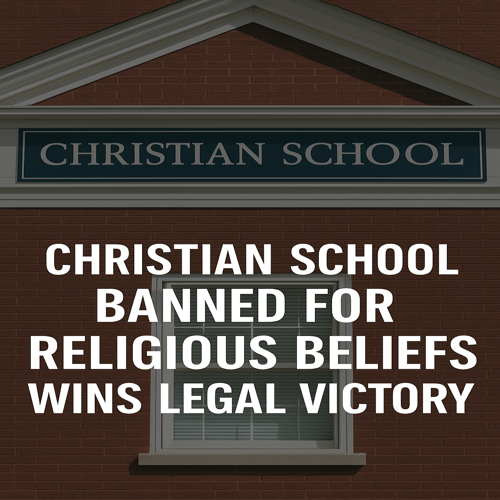Court rules Vermont officials violated First Amendment protections
A Vermont Christian school has won a landmark legal battle after being banned from athletic competition for refusing to compromise its biblical convictions on gender and sexuality. The federal court’s ruling reaffirms that religious schools cannot be punished for holding fast to historic Christian beliefs, even when they conflict with modern progressive policies.
The Ban That Sparked a Legal Fight
Mid Vermont Christian School became the center of controversy in 2023 after its girls’ basketball team declined to compete against an opposing team that included a biological male identifying as female. Administrators explained that allowing boys to play against girls was unsafe, unfair, and a violation of the school’s faith commitments.
In response, the Vermont Principals’ Association (VPA) expelled the school from athletic leagues, cutting off its ability to participate in state tournaments. For a small private school, the punishment was devastating. Parents and students suddenly found themselves sidelined, not because of poor performance but because of their faith.
Alliance Defending Freedom, a national religious advocacy law firm that argued the case for Mid Vermont, hailed the decision as a “sweeping victory” for the school and its athletes.
“The government cannot punish religious schools—and the families they serve—by permanently kicking them out of state-sponsored sports simply because the state disagrees with their religious beliefs,” Alliance Defending Freedom Senior Counsel and Vice President of U.S. Litigation David Cortman said in a statement.
“We believe God created human beings male and female,” school leaders said at the time. “To deny that reality is to deny both science and Scripture. We cannot compromise our convictions simply to remain in a league.”
The Court’s Decision
After months of litigation, a federal court handed down its decision this week, siding with the Christian school. The court ruled that Vermont officials violated the First Amendment by penalizing Mid Vermont Christian for following its religious beliefs.
The decision also found that the school’s exclusion from competition constituted unlawful discrimination, stripping students of equal access to programs because of their faith. “Faith-based institutions have the same constitutional rights as anyone else,” one attorney for the school noted. “The state cannot weaponize sports policy to punish biblical convictions.”
A Victory for Religious Liberty
Conservatives hailed the decision as a major victory for religious liberty. Christian advocacy groups pointed out that the ruling reaffirms a bedrock principle: the government cannot coerce religious institutions to abandon their beliefs in exchange for public participation.
“This is about fairness and freedom,” said one commentator. “Christian schools should not be forced to bow to ideology that contradicts the Bible just to allow their students to compete.”
The Stakes for Women’s Sports
Beyond the religious freedom implications, the case also highlights growing concerns over the integrity of women’s athletics. Many parents and coaches argue that biological males hold inherent physical advantages in strength, speed, and endurance. Allowing them to compete against girls, critics warn, jeopardizes both fairness and safety.
The court’s decision effectively validated those concerns by recognizing the school’s right to protect female athletes from unfair competition. For many Christian families, that acknowledgment was long overdue.
“Girls deserve a level playing field,” one Mid Vermont parent said. “Our daughters should not have to risk injury or unfair defeat just because activists insist on redefining reality.”
Progressive Pushback
Unsurprisingly, the ruling has drawn sharp criticism from progressive activists. LGBTQ groups and media outlets like Outsports blasted the decision, claiming it gives license to “discrimination.” Some activists have gone further, arguing that Christian schools should lose accreditation or government recognition if they refuse to affirm transgender ideology.
But critics of this view argue that such rhetoric only reveals the left’s growing hostility toward religious freedom. “This isn’t about equality,” said one conservative legal analyst. “It’s about coercion—forcing Christians to celebrate and endorse beliefs they cannot accept.”
National Implications
The Vermont case is expected to reverberate nationally as courts wrestle with similar disputes. Across the country, schools, churches, and faith-based organizations face mounting pressure from progressive lawmakers and agencies that prioritize gender ideology over religious conviction.
The Biden administration, for example, has sought to expand Title IX protections to include gender identity, a move critics warn will erase hard-won safeguards for women and punish religious schools. The Vermont ruling stands in stark contrast, reaffirming constitutional limits on state power.
“This is a much-needed check on government overreach,” noted a conservative commentator. “If a Christian school can be banned from sports for believing Genesis 1:27, then every believer in America is at risk.”
A Message to Believers
For Christian parents and educators, the court’s decision offers reassurance that their convictions remain legally protected. Mid Vermont Christian School now has the right to rejoin athletic competition without compromising its biblical foundation.
The message is clear: faith-based institutions do not forfeit their constitutional protections simply because they hold unpopular views.
“This victory is not just for one school,” one parent said. “It’s for every Christian family who believes the truth is worth defending.”



